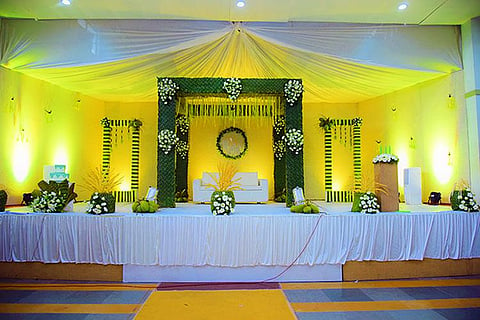

If you live in the Kolayadu grama panchayat in Kerala's Kannur district, chances are that you run the risk of being refused your marriage certificate for breaking one single rule. What could land you in such a crisis, you ask? The answer is simple: coming in the way of the panchayat's efforts to reduce plastic waste.
The Kolayadu grama panchayat, with a population of about 24,000 people, is in the process of implementing an initiative to cut down on non-biodegradable waste generated every day.
Realising that one of the major sources of plastic waste is weddings, the panchayat has now made it mandatory for all marriage functions to follow a green protocol. And failure to abide by this protocol could means that one would be denied their marriage certificate.
The panchayat now insists on a document from a ward member attesting to the fact that the wedding was indeed free of plastic.
The initiative that began in November last year is called Malinyamillatha Mangalyam (which loosely translates to 'a wedding without waste').
A model village
Speaking to TNM, Kolayadu panchayat president Suresh says that they brought out a notification in which a green protocol was made mandatory for weddings and other public functions.
The protocol says that plastic should not be used for any functions whatsoever. And if more than 100 people are attending the function, then prior permission should be taken from the panchayat to conduct the function.
"At one point, effective management of plastic waste was a major concern for our panchayat. When we started to think about means to tackle the issue, we realised that a majority of the plastic waste was being generated at weddings. People would just dump them on road sides, leading to birds and stray dogs feeding on them, which in turn lead to a foul smell in the neighbourhood," Suresh says.
The protocol mandates that weddings should not use plastic to serve food or as decorations.
"Even chocolates cannot be distributed at the wedding, since it is wrapped in plastic. Ice cream and other desserts should not be served in disposable plates or cups," Suresh says.
According to the protocol, families need to inform the panchayat well ahead of the wedding. The families will then be briefed by panchayat and Kudumbashree officials on ways to cut down on plastic.
On the day of the wedding, the panchayat will put up a banner at the venue, announcing that the wedding is "green".
Any family that fails to follow the protocol gets fined up to Rs 10,000. Only after the ward member personally certifies that the wedding was indeed conducted in regulation with the green protocol will the marriage certificate be issued.
As an alternative to disposable plates and cups, steel and glass utensils are now being used.
"We have made steel plates and glass utensils available at various centres in the panchayat (in clubs) so that the people can avail of them. In many places, the utensils are given free of cost, but in some areas that isn't possible," Suresh says.
While Suresh proudly declares that most of the people in the panchayat have followed the protocol and that only a few people have defaulted so far, he admits that there was resistance from the public initially.
While some did not feel the need to cut down on plastic, some others were apprehensive about having to clean all the steel/glass utensils used for the wedding function.
"People turn to disposable plastic items because they are cheap, and can be used once and thrown off. There is no need to maintain it. So when we first told them to switch to glass or steel utensils, many families objected saying that they cannot clean the vessels after use," he says.
However, when the panchayat offered to form a team that will take up the responsibility of cleaning the vessels after use, the families gave in.
Other initiatives
The Kolayadu panchayat has also started an initiative in which non-biodegradable electronic waste are collected from homes and given to recycling units.
Households in all the 14 wards of the panchayat have been asked to segregate their glass/electronic waste and the panchayat collects them once a year.
Earlier this month, the panchayat has also rolled out another initiative to encourage people to plant more trees. In this initiative, the panchayat has made it mandatory for every new construction site to plant 5 trees. This is now the new criteria for obtaining construction permit from the panchayat.
"They have to show us photographs of the trees in order to get the permit. Any construction will, on an average, take 2 years to complete. So once the project is completed, the panchayat has to issue a building number. For this, we will insist that the owners apprise us about the current state of the trees they planted at the beginning of the construction work," Suresh says.
Officials believe that all these efforts will lead to the panchayat becoming a plastic-free zone in the years to come.